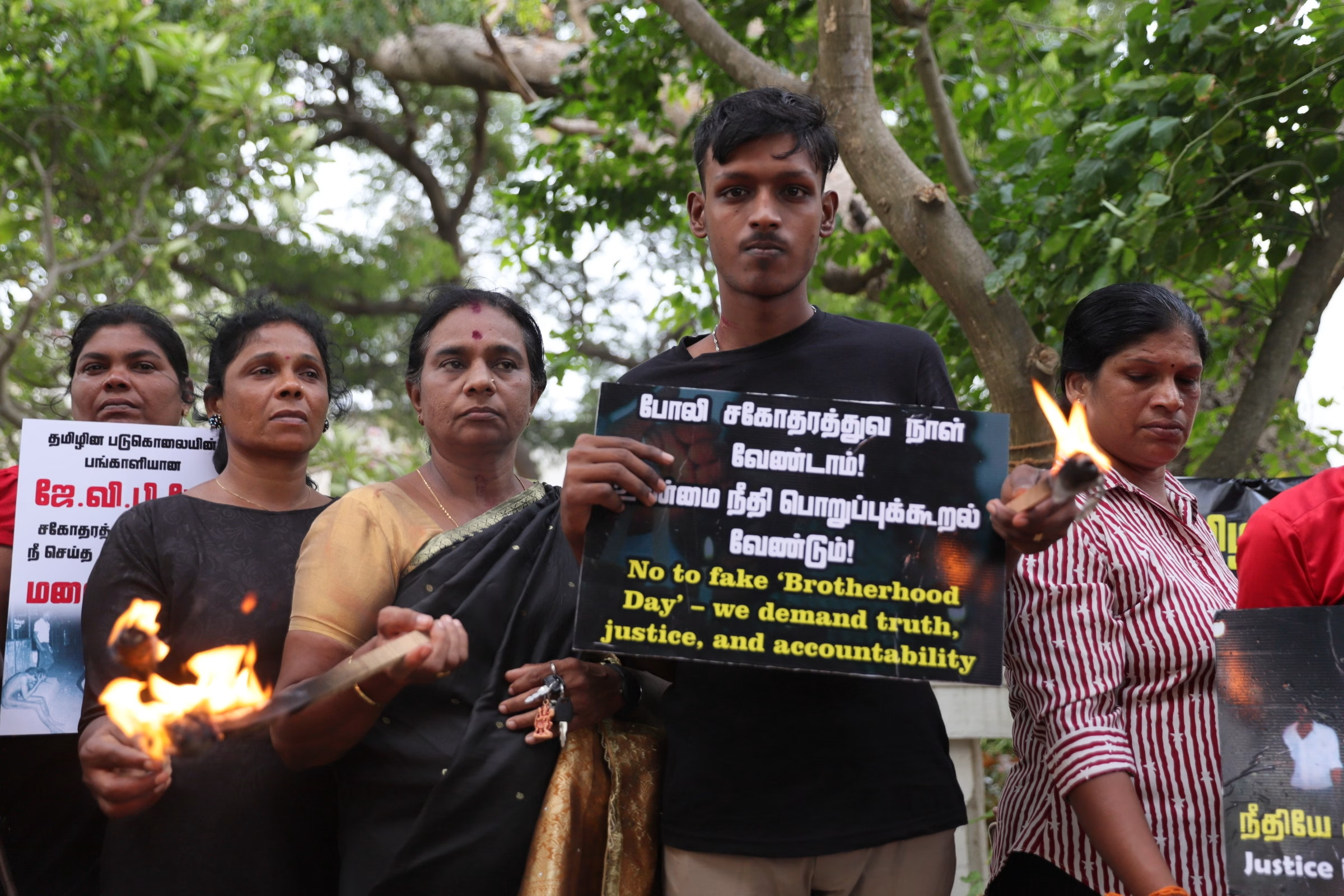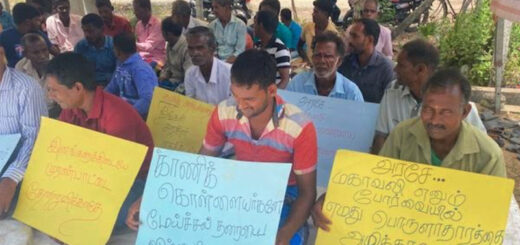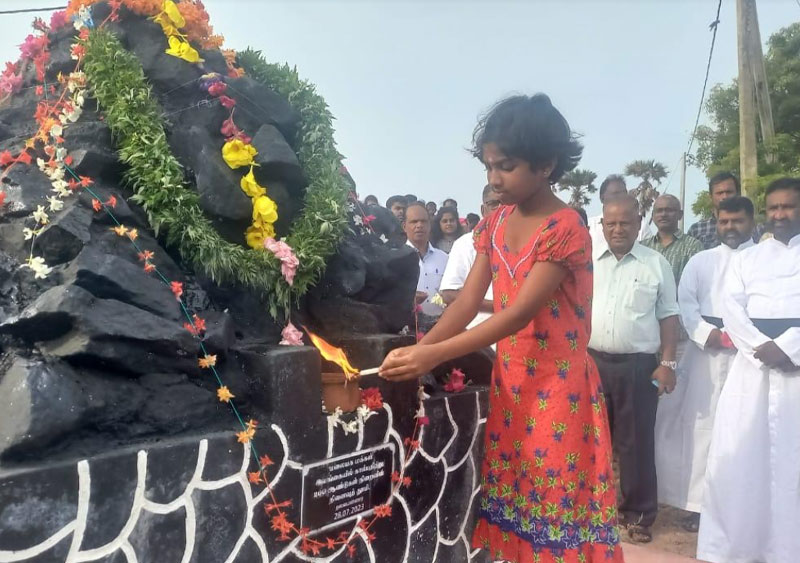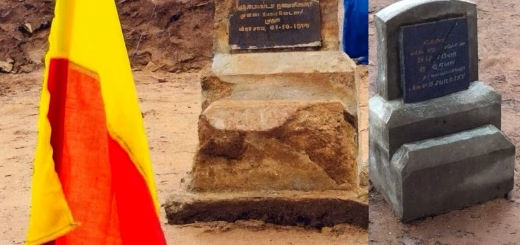Special govt-sponsored train dispatched to Jaffna slammed as a ‘drama’

A Tamil political party in the North has strongly denounced a recent event where members of the current government’s youth wing travelled to Jaffna on a fun tour, coinciding with the 42nd commemoration of Black July.
The group was seen singing baila songs during the journey, sparking public anger.
Remembrance events were held across the Northern and Eastern provinces as well as in Borella, demanding justice for over 3,000 Tamils who were killed in the 1983 violence that began in Tirunelveli, Jaffna— with state complicity.
Participants at a commemoration in Jaffna displayed placards with slogans such as “No to a False Brotherhood Day!” in protest of the government initiative.
The government had earlier announced that members of the Socialist Youth Union were visiting Jaffna aboard a ‘Brotherhood Train’ as part of ‘Brotherhood Day 2025’, conducted under the slogan “Let’s Fly Together!”
Members of the Socialist Youth Union who took part in the journey shared photos on social media showing themselves singing upbeat baila songs in both Sinhala and Tamil during the trip.
Former Parliamentarian Selvarajah Gajendran, Secretary of the Tamil National People’s Front, who led the Black July commemoration near the Muniyappar Kovil in Jaffna on the evening of Wednesday (July 23), strongly criticised the government’s initiative.
He claimed that the train was sent to the North by individuals he described as racists, under the pretence of promoting unity, with the intention of undermining the ongoing demand for an international criminal probe into what he referred to as the Tamil genocide.
“These individuals, who now represent the National People’s Power, are attempting to whitewash the atrocities committed against the Tamil community,” Gajendran stated. “Their aim is to shift blame solely onto former regimes, to suggest that the crimes were the result of past leadership alone, and to falsely portray that the Tamil community is now reconciled and willing to coexist peacefully under the present administration. This misleading narrative is designed to deceive the international community and weaken the Tamil people’s call for global accountability. The so-called bridge of friendship is merely a cover for this agenda.”
Former Member of Parliament Selvarajah Gajendran, Secretary of the Tamil National People’s Front, has strongly criticized the current president, accusing him of orchestrating a staged performance in the North by sending people via train.
Gajendran recalled the president’s past as a parliamentarian, alleging his support for the atrocities committed against the Tamil population.
He stated, “Anura Kumara, a known racist, openly backed the oppression of the Tamil people during Chandrika Kumaratunga’s tenure and similarly aligned with the Rajapaksa regime during the genocide. Now, under the banner of the National People’s Power, he is pretending to safeguard the interests of the Tamil community, while in reality, he is using this spectacle to deceive.”
Meanwhile, provincial reporters confirmed that a separate Black July remembrance event was held in front of the Pongu Tamil Memorial near the Vavuniya Municipal Council, organized by the Tamil National Council.
Another remembrance event was held outside the Borella Cemetery in Colombo, calling for justice for the victims of Black July.
The event was organized by the “North-South Brotherhood” initiative.
At the University of Jaffna, students also marked the 42nd anniversary of the tragedy on Wednesday, July 23, holding a solemn tribute on campus.
They laid flowers before a haunting image that depicts a Sinhala mob preparing to burn a Tamil youth alive and unclothed at the Borella bus terminal during the 1983 violence.
Meanwhile, in the Eastern Province, members of the Karaitivu Pradeshiya Sabha, led by S. Bhaskaran of the Ilangai Tamil Arasu Kachchi (ITAK), held a commemorative ceremony at the Karaitivu beach in Ampara, lighting oil lamps in memory of those who were killed 42 years ago.
Black July
The brutal anti-Tamil riots known as Black July, which erupted on July 23, 1983, remain one of Sri Lanka’s darkest chapters.
The violence, which continued for several days, led to the deaths of thousands of Tamils and the destruction of property worth billions, including numerous homes.
The violence initially broke out in Tirunelveli—home to the University of Jaffna—following a landmine explosion that killed 13 Sri Lankan soldiers on Palali Road, between Parameswara Junction and Tirunelveli Junction.
In response, army personnel launched operations that same night and into the following day, targeting surrounding villages. Fifty-one civilians were killed, and numerous homes along Palali Road and in Sivan Amman village were set ablaze during the military raids.
Records from the North East Office for Human Rights (NESOHR) and the North East Statistical Centre confirm that among the victims were a six-year-old boy and an eleven-year-old girl.
Despite the passage of 42 years since the violence that began in Colombo and rapidly spread throughout the country, no one has been held accountable for the mass atrocities committed against Tamils.
The situation was further inflamed when the bodies of the soldiers killed in the landmine explosion were taken directly to the Borella Cemetery bypassing their hometowns and villages and subsequently buried at a state-operated mass grave, triggering widespread unrest.









